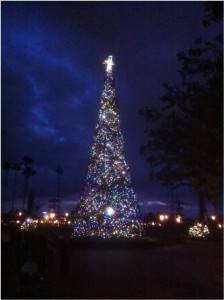 DECEMBER 2011 VERY DIFFERENT THAN DECEMBER 2010 AT WALT DISNEY WORLD?
DECEMBER 2011 VERY DIFFERENT THAN DECEMBER 2010 AT WALT DISNEY WORLD?
Later today the Walt Disney Company will release its FY12 Q1 earnings, covering October through December 2011.
Comparison of such results to year-earlier figures is always of profound interest to analysts.
In this comparison, December 2011 may come in light at Walt Disney World and Disneyland compared to December 2010.
THE SHIFT OF CHRISTMAS FROM SATURDAY TO SUNDAY CREATES A WEEK LESS OF HIGH HOTEL RATES
Walt Disney World varies the nightly rates of its hotel rooms substantially over the year to capture value from increased seasonal demand or willingness to pay.
Traditionally, the highest increases are over the Christmas-New Year holidays, with prices up 55-90% compared to lower-priced periods.
However, demand for this period is profoundly affected by the day Christmas falls on, as that day shapes the beginning of the Christmas break school holidays that create the December demand.
In 2010, Christmas fell on a Saturday; as a result, lots of kids had the week before it off, and Disney World began its 2010 holiday price increase on December 17 (with a further bump on 12/25).
In 2011, Christmas was on a Sunday; as a result, fewer kids had the prior week off, and the 2011 holiday price bump did not begin until December 23—six nights later.
The combined effects of more days of reduced demand (and hence reduced occupancy) earlier in December and fewer days with higher prices, by my back of the envelope calculation, could have cut as much as ten percent off of December 2011 hotel revenue compared to 2010.
And this is after the impact of Disney World’s new-for-2011 fall price season, which had the effect of raising prices in earlier December 2011 more than 10% compared to 2010…but possibly also reducing demand.
(Note that the Orlando Sentinel has already reported worse December 2011 price and occupancy results compared to December 2010 at the non-Disney area hotels.)
So it’s possible that December—and hence the quarter—may not look as good compared to 2010 at the domestic parks as some analysts may be thinking it will.
These calendar effects are of course out of Disney’s control—even Mickey Mouse can’t set the date of Christmas—but they are visible well in advance, and analysts thus can incorporate them in their earnings forecasts if they wish to get to that level of detail.
Leave a Reply
Be the First to Comment!